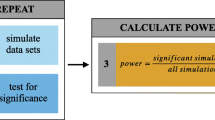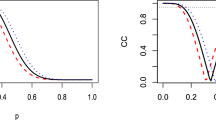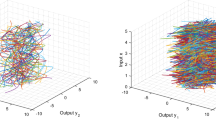Abstract
The sum, difference, product and quotient of two functions with different domains are usually defined only on their common domain. This paper extends these definitions so that the sum and other operations are essentially defined anywhere that at least one of the components is defined. This idea is applied to propositions and events, expressed as indicator functions, to define conditional propositions and conditional events as three-valued indicator functions that are undefined when their condition is false. Extended operations of “and”, “or”, “not” and “conditioning” are then defined on these conditional events with variable conditions. The probabilities of the disjunction (or) and of the conjunction (and) of two conditionals are expressed in terms of the conditional probabilities of the component conditionals. In a special case, these are shown to be weighted averages of the component conditional probabilities where the weights are the relative probabilities of the various conditions. Next, conditional random variables are defined to be random variables X whose domain has been restricted by a condition on a second random variable Y. The extended sum, difference, product and conditioning operations on functions are then applied to these conditional random variables. The expectation of a random variable and the conditional expectation of a conditional random variable are recounted. Theorem 1 generalizes the standard result that the conditional expectation of the sum of two conditional random variables with disjoint and exhaustive conditions is a weighted sum of the conditional expectations of the component conditional random variables. Because of the extended operations, the theorem is true for arbitrary conditions. Theorem 2 gives a formula for the expectation of the product of two conditional random variables. After the definition of independence of two random variables is extended to accommodate the extended operations, it is applied to the formula of Theorem 2 to simplify the expectation of a product of conditional random variables. Two examples end the paper. The first concerns a work force of n workers of different output levels and work shifts. The second example involves two radars with overlapping surveillance regions and different detection error rates. One radar's error rate is assumed to be sensitive to fog and the other radar's error rate is assumed to be sensitive to air traffic density. The combined error rate over the combined surveillance region given heavy fog and moderate air traffic is computed.
Similar content being viewed by others
REFERENCES
Adams, E. W.: Probability and the logic of conditionals, in P. Suppes and J. Hintikka (eds.), Aspects of Inductive Logic, North-Holland, Amsterdam, 1966, pp. 265–316.
Calabrese, P. G.: An algebraic synthesis of the foundations of logic and probability, Inform. Sci. bd42 (1987), 187–237.
Calabrese, P. G.: Reasoning with uncertainty using conditional logic and probability, in Proc. First International Symposium on Uncertainty Modeling and Analysis, IEEE Computer Society, 1990, pp. 682–688.
Calabrese, P. G.: Deduction and inference using conditional logic and probability, in I. R. Goodman, M. M. Gupta, H. T. Nguyen and G. S. Rogers (eds.), Conditional Logic in Expert Systems, North-Holland, Amsterdam, 1991, pp. 71–100.
Calabrese, P. G.: A theory of conditional information with applications, Special Issue on Conditional Event Algebra, IEEE Trans. Systems Man Cybernet. 24(12) (1994), 1676–1684.
Calabrese, P. G.: An extension of the fundamental theorem of Boolean algebra to conditional propositions, Part I (1-18) of “Conditional event algebras and conditional probability logics” by P. G. Calabrese and I. R. Goodman, in R. Scozzafava (ed.), Probabilistic Methods in Expert Systems, Proceedings of the International Workshop, Rome, Italy, Societá Italiana di Statistica, 1996, pp. 1–35.
Calabrese, P. G.: Deduction with uncertain conditionals, Inform. Sci., in press.
De Finetti, B.: La logique de la probabilite, in Actes du Congres International de Philosophie Scientifique IV, Hermann, Paris, 1936, pp. 1–8.
Dubois, D. and Prade, H.: Conditional objects as nonmonotonic consequence relationships, IEEE Trans. Systems Man Cybernet. 24(12) (1994), 1724–1740.
Kolmogorov, A. N.: Foundations of the Theory of Probability, Chelsea, 1956 (1st edition: Grundbegriffe der Wahrscheinlichkeits-rechnung, Berlin, 1933).
Papoulis, A.: Probability, Random Variables, and Stochastic Processes, McGraw-Hill, 1965.
Suppes, P. and Zanotti, M.: Z. Wahrsch. verw. Gebiete 60 (1982), 163–169. (Also in [13].)
Suppes, P. and Zanotti, M.: Foundations of Probability with Applications, Selected Papers 1974-1995, Cambridge Univ. Press, 1996.
Author information
Authors and Affiliations
Rights and permissions
About this article
Cite this article
Calabrese, P.G. Operating on Functions with Variable Domains. Journal of Philosophical Logic 32, 1–18 (2003). https://doi.org/10.1023/A:1022822822130
Issue Date:
DOI: https://doi.org/10.1023/A:1022822822130




